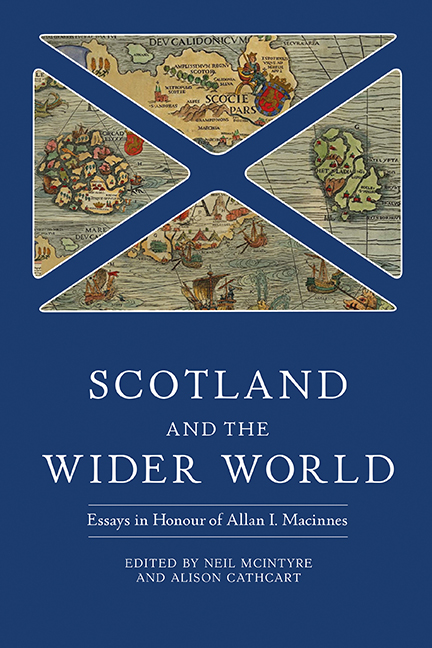Book contents
- Frontmatter
- Contents
- List of Contributors
- Preface
- List of Abbreviations
- 1 Covenants, Clans and Unions in Context: Celebrating the Scholarship of Allan I. Macinnes
- Part I Peoples and Cultures in Britain and Ireland
- Part II War, Religion and the House of Stuart
- Part III Union, Empire and Enlightenment
- List of Publications
- Index
- Tabula Gratulatoria
- Studies in Early Modern Cultural, Political and Social History
8 - Charles Edward Stuart and Seven Hundred Irish Soldiers? A Reappraisal of a Turning Point in the ‘45
Published online by Cambridge University Press: 26 May 2022
- Frontmatter
- Contents
- List of Contributors
- Preface
- List of Abbreviations
- 1 Covenants, Clans and Unions in Context: Celebrating the Scholarship of Allan I. Macinnes
- Part I Peoples and Cultures in Britain and Ireland
- Part II War, Religion and the House of Stuart
- Part III Union, Empire and Enlightenment
- List of Publications
- Index
- Tabula Gratulatoria
- Studies in Early Modern Cultural, Political and Social History
Summary
Charles Edward Stuart does not have many fans among modern historians of Jacobitism. While it is still possible to be impressed by his boldness and dash in 1745, most assessments of the prince tend to be strongly coloured by his selfishness, mendacity and pig-headedness during the rising and his alcoholism and domestic violence in the years that followed. Beneath a facade of charisma and charm Murray Pittock finds him a bitter, paranoid and authoritarian man, with a bad case of arrested development in terms of his volatile, tantrum-driven relationships with older men whom he viewed as father figures. Frank McLynn sees Charles Edward's behaviour as characterised by ‘depression, rage, [and] paranoia’, keyed to ‘a total lack of any mechanism for dealing with authority, and hence a fatally blurred distinction between his own will and reality’. Allan Macinnes concludes that, whatever virtues he may have had, ‘he can be castigated accurately as a rash adventurer’. And this writer would not disagree in the slightest with these analyses.
The purpose of this essay, however, is not to drive one more nail into the coffin of the Bonnie Prince's reputation, but to explore the significance of a telling, and historiographically intriguing, moment in Charles Edward's career. As is well known, the prince landed in mainland Scotland on 25 July 1745 accompanied by only the famous ‘seven men of Moidart’, and when the ship that had brought him to Scotland, the Du Teillay, sailed away Captain Claude Durbé and its owner, Antoine Walsh, left him with ‘not more than twelve men for company’. But it was not supposed to be like that. During the first months of 1745 Charles Edward made plans to arrive with a great many more. To be specific, his onset was to be supported by a second ship, the Elisabeth, carrying Irish soldiers in French service, plus 60 gentleman volunteers specially enlisted in a company of the French marines, plus circa 1,500 muskets, 1,800 broadswords, a light artillery train of 22 pieces and barrels of powder, ball and flint capable of sustaining this force immediately after it landed.
The best-laid plans of mice and princes, of course, gang aft agley, and Charles Edward arrived in Scotland with none of the soldiers, none of the marines and only part of his painfully accumulated military equipment.
- Type
- Chapter
- Information
- Scotland and the Wider WorldEssays in Honour of Allan I. Macinnes, pp. 116 - 132Publisher: Boydell & BrewerPrint publication year: 2022



